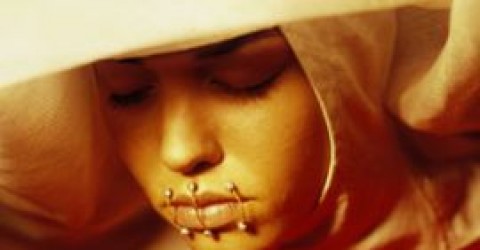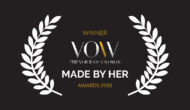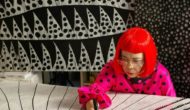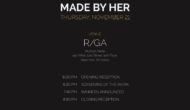WRITER: MARGARET ATWOOD

MARGARET ATWOOD
Author.
THE HANDMAIDS TALE (Novel/Film)
Margaret Atwood's award-winning dystopian novel, The Handmaid's Tale, was published in 1985 to critical and popular success. The novel is set in a near-future in which right-wing fundamentalists overthrow the United States government and set up the Republic of Gilead in its place. Gilead is a totalitarian and theocratic state in which fertile women are kept in sexual slavery as Handmaids and forced to bear children for infertile couples. Here Junot Díaz talks to Margaret Atwood about The Handmaid's Tale and the recent TV series based on the novel.
JD: I’m going to get right in. “Make Margaret Atwood Fiction Again” was a sign at the Women’s March that resonated deeply with many people who feel that life under Trump is something of a dystopia for women. Do you feel that way?
MA: Yes. We’re in Canada. But as you know, I lived in the States for some years, and have a lot of friends there. It’s not only Trump. The general climate, in some parts of the United States, is certainly heading in a Handmaid’s Tale direction. And that is why the recent sit-ins in state legislatures were so immediately understandable—a group of women in Handmaid costumes turned up, for instance, in Texas, while an all-male batch of lawmakers were passing laws on women’s health issues. They just sat there, they didn’t say anything, so they couldn’t be ejected, and there was a very telling photograph of them surrounded by men with guns, which could have been right out of the television show.
JD: I’ve not seen that. So, our current society is in many ways doing a better job reenacting the book than it would have imagined.
MA: Much more than it would have imagined. In 1985 it was only a possibility. In some places in the United States today, it’s approaching reality. And as you know, I put nothing into the book that people had not done at some time, in some place. And in some countries in the world, these are pretty much the realities now.
JD: I read The Handmaid’s Tale when it was first published, and despite the rapid rise of the religious right and its effort to roll back reproductive rights in that decade, the world in the book still felt distant. Are you struck by how readers who are coming to the book now, or people who are rereading it—how different the experience has been for them?
MA: It is quite different now. There were national differences at the time of publication. In England it was viewed as a jolly good yarn, but they didn’t think of Gilead as something that was going to happen to them, because they did their religious warfare in the seventeenth century, and had lived through a lot of other bad stuff that they thought they had gotten over—although, in recent days, apparently not. In Canada, it was the usual worried Canadian question—“Could it happen here?”—though I didn’t have to explain to Canadians why my characters were escaping to Canada, because we have escaped to quite a lot in history. But in the United States, particularly on the West Coast, they said—somebody spray painted on the Venice Beach seawall—“The Handmaid’s Tale is already here.” That was in 1985.
Some people mistakenly thought that the book was somehow anti-Christian. That’s not the case that is being made. Some Christians would resist such a regime, and do in the book. Others would be eliminated by the regime, because they would be the competition. And others would use religion as an excuse for what they’re doing—which has certainly happened a lot in history too, with all sorts of religions.
JD: When I recall the novel’s reception in the eighties, there was a lot of turmoil around that question—about whether the novel was too hard on fundamentalist Christians. And yet, now, of course, that criticism has fallen away, and it seems to me that what was most frightening about the novel is only now coming to the foreground. Publicly, it seems that there’s more space for folks to talk about the state-sanctioned rape that the novel portrays than there was in the mid-eighties.
MA: Oh, for sure. Well, part of the exploration is—if you want to take the Bible literally, how literally do you want to take it? Which parts are you going to be “literal” about? The Bible is an amazingly compendious book, and people have been foregrounding parts of it and backgrounding other parts forever. But if you want to take the text literally—using polygamy and using Handmaids as surrogate mothers despite anything they might have to say about it—it’s right there. Jacob and his two wives, Rachel and Leah, and their two handmaids—amongst the four women they have twelve sons, but the wives claim the Handmaids’ babies, which is why I put that excerpt from Genesis at the front of the book, and why I called the training place for Handmaids the Rachel and Leah Center. It’s very literal.
But the real question is, if the United States were going to have a totalitarianism, what kind of totalitarianism would it be? We’ve had all kinds in the world, including atheist ones. But if the U.S. were ever going to go down that path, what would be the device under which they would do it? It certainly would not be communism.
JD: I think that’s very true. And you’ve said this before in other contexts, the fact that Gilead exists at low levels in so many places.
MA: No kidding. And sometimes at pretty high levels too. There are thirteen countries in the world in which homosexuality is punishable by death.
JD: Yes, another element in the novel, which I think, again, has taken on entirely different resonance than it did in the mid-eighties. I was going to say that, again, you have what we might call the “long view.” Do these times we’re living in feel particularly apocalyptic? In your life, what other dark periods do these times recall?
MA: Well, since I was born in 1939, two months after the Second World War began, of course I was immersed in news about totalitarianism as I was growing up—so Nazis, Mussolini, Joe Stalin, followed by Mao. And then we’ve had more than a couple since that time, such as Cambodia under Pol Pot, and Romania, where Ceausescu mandated four children per woman, whether the woman could afford those children or not, and you had to have a fertility test every month, and if you weren’t pregnant, you had to say why. What was the result? A lot of orphanages, a lot of neglected children, and a lot of dead women. So if the United States wants to go in that direction, how are they going to prepare for the results? Is that what they want? Orphans, dead women, and so forth?
JD: My god. I did not know that.
MA: Then there’s child-stealing. Again, I put nothing in the book that people have not done—there have been so many instances of that throughout history. Amongst them, Hitler stole twelve thousand blond Polish children, and placed them with German families, hoping they would turn into blond German children. And he had a “Lebensborn” program for SS families—unmarried women produced children for them. And of course in Argentina, under the Generals—where they were dropping people out of planes—if you were pregnant, they didn’t drop you out of a plane or otherwise kill you until you had the baby, and then they placed it with a high-ranking junta family. And the fallout now is that some of the children grew up and then found out the truth about their background.
JD: Just listening to that kind of tour of hell that you just gave, one thing that’s really striking and comes back to the core alibi of the Gilead regime is the centrality of children. That, yes, we’ve got these enemies of the state who we’re going to torture to death, but they do have these children who are a very valuable resource.
MA: That’s right. Gilead, of course, is arranged as a true totalitarianism, where the people at the top get the good stuff. Children are seen as the good stuff, due to their rarity.
JD: Well, I only have a couple more questions. In the novel, Gilead deals with its racial others with Nazi-ish precision.
MA: They put them into closed “homelands.” Like apartheid South Africa.
JD: What’s happening there is clearly less than savory. The TV adaptation mutes this. And my question would be—
MA: They updated the time period of the “before” part of the show to “now.” In 1985, it was much more plausible that you might be able carry out that kind of re-segregation.
JD: To round up all the folks of color.
MA: Yes. But the modern television version—which brought us Samira Wiley as Moira, for whom we are grateful—takes the view that there are, at the present time, many more—especially in cities, certain cities—there are many more interracial friendships and relationships than there would have been in 1985. Which is true. And Bruce Miller, the showrunner, said, in essence, who wants to watch a show that’s all white people? Not to mention that Hulu has a general policy of diversity. We also both felt that in Gilead—the modern TV version—fertility would rank higher than racialization as a way of categorizing people—deciding who gets what treatment.
JD: In some ways though, what’s interesting about the homelands, or the Colonies in the novel, it kind of creates—it’s what happens with the women who are in some ways difficult, to use a euphemism.
MA: They end up at the secret Gilead brothel, Jezebel's.
JD: Yeah, or they get sent off to the camps. These homelands in the novel operate at the most nightmarish horizon of what could be happening, at least to the reader.
MA: I would contend that it might be easier to escape from Jezebel's. So from the point of view of somebody writing the television script—Moira is at Jezebel's, but there’s a chance she could get out. And she has gotten out once before.
JD: That is very very true. Finally—I was in Toronto recently, only a couple of weeks ago, and it was a very fascinating time to be in Toronto, I have to tell you. For a number of reasons: first of all, TheHandmaid’s Tale show, the explosion around the show, was coming into full view. And so it was interesting for me, I spent like four days in Toronto talking to a whole bunch of smart, bright young folks. Kind of the new face of Toronto in some ways. And it seems like currently Toronto—and we could say by extension Canada—has two global superstars: Margaret Atwood and Drake.
MA: This has been wonderful. Because so unexpected!
JD: So, have you met Drake?
MA: I haven’t met Drake, but I have of course met people who have met Drake. But you have to realize how o-l-d I am. I’m not likely to go to the same parties. Or many parties at all, to be frank.
JD: I understand. I just think that, Canada—I’ll say this to the whole nation—you are missing a great opportunity to put these two folks together. Have you listened to his music? Do you have any opinions?
MA: Wouldn’t it be fun for him to have a cameo in season two of The Handmaid’s Tale?
JD: Well, there you have it.
MA: There you have it. I’ll drop that notion into the ear of Bruce Miller, the showrunner, and see what he can do with that, because of course the show is filmed in Toronto. Maybe Drake could help smuggle someone?
JD: Yeah. And it is an extraordinary time. I’ve never seen young Canadians so thrilled to have these models.
MA: And energized. Toronto is, according to the people who count, the most diverse city in the world.
JD: What a lot of these young folks were saying to me was that one of the mainstream Canada things was to be kind of humble, not to dream too big. And I have to say, you have given a lot of young people—you and Drake—new horizons. And it is a wonderful thing to see.
MA: Thank you.
JD: And I hope we run into each other again at a writer’s thing.
MA: I hope so too, and you’ve given me a new idea. Drake in The Handmaid’s Tale!
JD: Pursue it, please!
This interview is part of our Global Dystopias project. Learn more about it and become a member to receive our forthcoming Global Dystopias print issue edited by Junot Díaz.
http://bostonreview.net/literature-culture-margaret-atwood-junot-diaz-make-margaret-atwood-again



